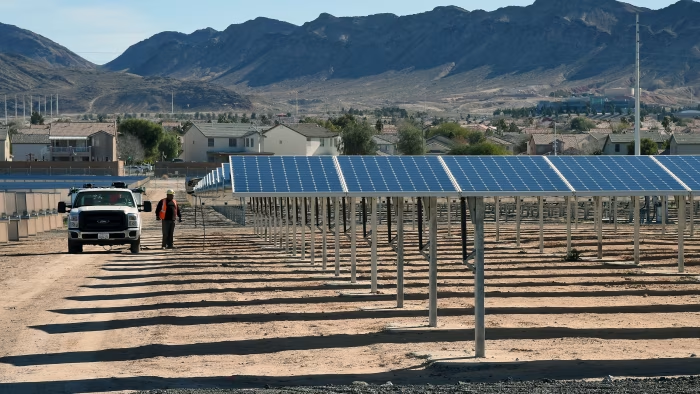The recent decision by the Bureau of Land Management to cancel the Esmeralda 7 solar project marks a significant move in the Trump administration’s ongoing reorientation of energy policy, particularly concerning renewable energy initiatives. This project, which was not only the largest solar installation of its kind in North America but also capable of powering nearly 2 million households, has now fallen victim to an increasingly reserved approach towards renewable energy under the current administration.
The Esmeralda 7 project, a major development in the Nevada desert, included a network of seven solar farms coupled with battery systems and was spearheaded by NextEra Energy, the largest renewable energy company in the United States. It had made strides towards approval under the Biden administration, highlighting a stark contrast to the current stance taken by the Trump administration, which has openly dismissed renewable projects as a “scam.”
The recent actions come as the Department of the Interior, led by Doug Burgum, has shifted its focus toward the facilitation of fossil fuel projects while imposing stricter regulations on solar and wind energy initiatives. This marked change has not been limited to solar energy; key offshore wind projects have also encountered turbulence, with work halts and regulatory scrutiny. For instance, in April, the administration directed Equinor to cease operations on its Empire offshore wind farm, and similarly issued stop work orders affecting Ørsted’s Revolution Wind project. Though both projects resumed, the disruptions raised concerns over market confidence and the strategic planning needed to meet the nation’s rising energy demands.
The urgency for renewable energy solutions has never been more pressing, as the demand for electricity grapples with the emergence of data centers catering to artificial intelligence advancements, along with the growing trend towards electric vehicles. A report from NV Energy, Nevada’s largest utility provider, indicated a 34 percent expected increase in electricity demand by 2035 compared to 2022 levels.
Industry advocates, such as Ben Norris from the Solar Energy Industries Association, have conveyed frustration over the administration’s apparent disregard for established regulatory frameworks. Norris emphasized the need for a more serious commitment from the government to support renewable energy innovations, stating, “We need more power on the grid, fast, and the solar and storage industry is ready to provide it, but we need the administration to get serious about truly achieving American energy dominance.”
While the Department of the Interior has not explicitly confirmed the cancellation of the Esmeralda 7 project, it has suggested that the project developers may opt for alternative methods to reassess project impacts, including submitting individual project proposals. NextEra Energy has voiced its ongoing commitment to conducting a thorough environmental analysis in collaboration with the Bureau of Land Management, though the direction of future projects remains uncertain.
In summary, the cancellation of the Esmeralda 7 solar project underscores a significant pivot in U.S. energy policy under the Trump administration, sparking concern among industry players regarding the long-term implications for renewable energy investment and infrastructure as electricity demands increase nationwide.







